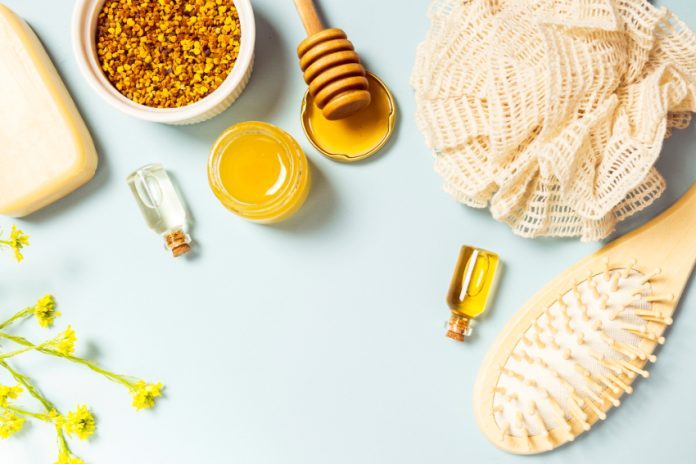Moving through the air in a display of mesmerizing acrobatics, a stingless honey bee native to the Americas navigates through the jungle toward its hive inside the trunk of a hollow Guanacaste tree. Two tiny pieces of pollen plucked from a nearby jabín flower stick to its hind legs. Together with pollen from other medicinal plants harvested by millions of busy bees, powder from the jabín flower will be used to create one of the most potent health elixirs in the natural world, Melipona honey.
Sweet with a citric taste, this unique honey has gained international attention for its potential health benefits following a recent scientific study that shed light on its many medical uses. But 3,000 years ago, the Ancient Maya believed certain flowers, known as Melipona flowers, were divine beings that could transcend from the heavens to the underworld, giving honey its special properties. These flowers are the medicinal jabín, tajonal, tsitsilché, chakah and xtabentún flowers.
The difference between Mexican Melipona honey and regular honey is its remarkable antibacterial properties, which include Methylglyoxal (a natural germ-fighting compound). Beyond its antibacterial benefit, Melipona honey also boasts antiviral, anti-inflammatory, and antioxidant attributes. Throughout history, this honey has been employed to heal wounds, alleviate sore throats, guard against tooth decay and correct digestive issues.
Here are some of the best reasons why Maya Melipona honey is worth looking into:
Alleviate a sore throat
For those grappling with a sore throat, Melipona honey could offer extra relief. Its antiviral and antibacterial properties can help lessen inflammation and reduce bacteria count. It is smoother than regular honey and does not give you a sickly feeling if you have too much. Not only does Melipona honey target harmful bacteria but it also forms a soothing coating along the inner lining of the throat.
A 2021 study focused on patients undergoing chemotherapy for head and neck cancer researched Melipona honey as a preventive medicine for Streptococcus mutans – a bacteria strain that causes sore throats. The study discovered a significant reduction in Streptococcus mutans levels following Melipona honey consumption.
Historically, several types of honey have been effective as natural cough suppressants, but this study found Melipona honey to be even more effective than common cough syrups.
Enhance gastrointestinal well-being
Irritable bowel syndrome (IBS) stands out as a prevalent digestive disorder characterized by symptoms such as constipation, diarrhea, abdominal pain and irregular bowel movements. Ongoing research suggests that regular consumption of Melipona honey may help alleviate some of these symptoms. Demonstrating positive effects on antioxidant levels and inflammation in rats afflicted with both IBS and ulcerative colitis (a form of irritable bowel disease), Melipona honey was recommended for gastrointestinal health by the study mentioned above.
Melipona honey has also exhibited efficacy against strains of Clostridium difficile.
Clostridium difficile, commonly referred to as C. diff, is a bacterial infection causing severe diarrhea and bowel inflammation. While standard treatment requires antibiotics, recent studies have explored the potential use of Melipona honey against C. diff strains. Notably, Melipona honey demonstrated the ability to eradicate C. diff cells, suggesting potential as an effective alternative treatment.
Support dental care
The Centers for Disease Control and Prevention (CDC) reports that nearly 50% of Americans suffer from some form of gum disease. To safeguard against tooth decay and maintain gum health, minimizing the presence of harmful oral bacteria responsible for plaque build-up is crucial. Equally important is the preservation of beneficial oral bacteria that play a role in maintaining health in the mouth and throat.
Research indicates that Melipona honey targets harmful oral bacteria associated with issues such as plaque formation, gum inflammation and tooth decay. Specifically, studies have highlighted the effectiveness of Melipona honey with high antibacterial content in inhibiting the growth of detrimental oral bacteria like P. gingivalis and A. actinomycetemcomitans.
In a study exploring the impact of honey on plaque and gingivitis, participants were instructed to chew or suck on a Melipona honey chew, similar to chewy honey candy, for 10 minutes after every meal. The honey chew group showed a significant decrease in plaque and gingival bleeding compared to those who chewed a sugar-free stick of gum.
The notion of consuming honey for oral health might initially seem counterintuitive, given the association of sugar with cavities. However, as opposed to hard candy and refined sugar, Melipona honey’s potent antibacterial effects make it an unlikely contributor to cavities or tooth decay.
This miracle honey has plenty of other uses that are currently the focus of scientific research, but it will take some time for these uses to be verified by the medical community.
In the meantime, it remains that although stingless bee honey and other kinds of honey may hold potential health benefits, they are not a substitute for medical treatment or dietary control. Guidance should always be sought from healthcare professionals to establish the relevant course of treatment for corresponding conditions.
Mark Viales writes for Mexico News Daily.
